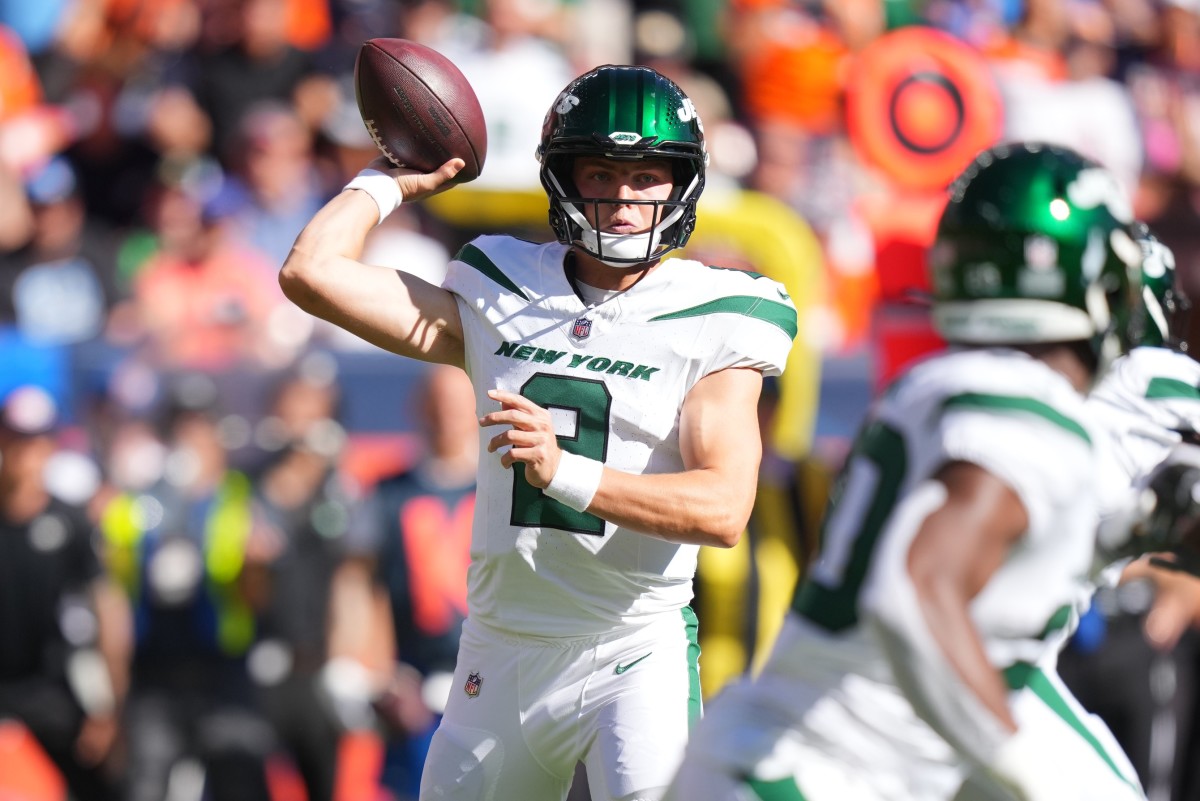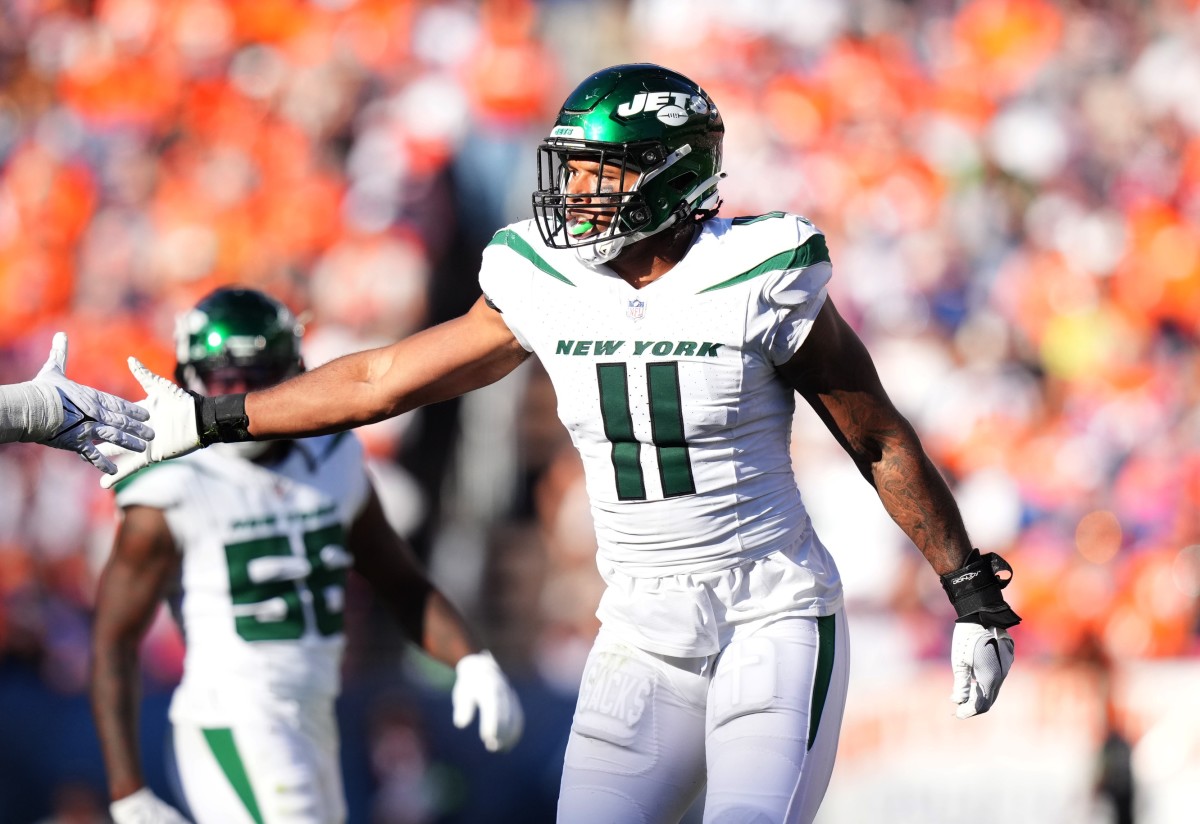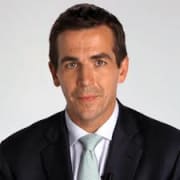There’s Hope for the Jets, and Zach Wilson, and Aaron Rodgers

More from Albert Breer: Ten Takeaways: Rival Executives Say Patriots ‘Quite Simply Have No Talent’ | T.J. Watt Credits Young Teammates Who Stepped Up in Rivalry Win Over Ravens
The rest of us looked at the performance—a week ago against the Chiefs—when the Jets were supposed to be a metaphorical movie set for the world champions, Patrick Mahomes, Travis Kelce and, of course, Taylor Swift, as a moral victory.
The rest of us thought it sure looked like something the team could build on. Maybe Zach Wilson wasn’t broken. Maybe a fast, aggressive defense was as good as we thought it was before Aaron Rodgers got hurt, an injury that, come to think of it, probably shouldn’t affect it much. Maybe Breece Hall would be where he was before tearing his ACL as a rookie, and Garrett Wilson would have his breakthrough season, even without Rodgers, after all.
Of course, that’s just the rest of us.
The people who matter in this equation weren’t really thinking that way at all.

“I don’t know. There’s a whole lot of season left,” Jets coach Robert Saleh told me Sunday night, as the team pulled through metro Denver. “I think everyone’s more upset that we didn’t get the opportunity to go win that game at the end of it—that we played our hearts out and that the end was the end. But I think this team knows that it’s capable of so much more. And I think this game is an example of it.”
Indeed, the Jets didn’t see the 31–21 win over the Broncos they were riding off with as the sort of revelation that the rest of us might have—somehow validating that the team going toe to toe with the Super Bowl champs a week ago was real. It was, to Saleh and others on that bus to the airport, more confirmation of what they knew coming out of a disappointing crash landing to the 2022 season, and what Rodgers knew when he chose to pursue a career reset with the star-crossed franchise.
After all the group’s been through already, there remained a lot of talent aboard that bus.
And the way all those talented guys feel about it, no one should be stunned with what we’re all seeing now, or what we saw specifically in Denver on Sunday, where the biggest plays were made by guys such as Wilson and Wilson and Hall and Jermaine Johnson and Quincy Williams proving that the well of talent in Florham Park runs far deeper than one player, as important as that one player might’ve been. Which is why Saleh kept setting the bar high.
“I think everyone is happy that we won, but we know that we lost a lot of points on the board,” he says. “I know that everybody knows we can play even better. And that’s encouraging. Just talking to our guys, it was for us. It felt like it was business as usual.”
The Jets, it turns out, after a really rough September that started with Rodgers’s injury and ended with lifeless losses to the Cowboys and Patriots, still are a pretty good team.
They knew that. Now the rest of us do, too.
Welcome to the Week 5 MMQB. Inside the column this week, we’ve got …
• T.J. Watt on the Steelers’ waking up late and winning their rivalry game.
• The Lions’ metamorphosis through the eyes of a guy who was there for every step of it.
• The Ten Takeaways, with an autopsy of a rock-bottom point for the Bill Belichick Patriots.
But we’re starting with the one team those Patriots beat, and how that team, left for dead two weeks ago, has come to life and could be a factor in the AFC. And maybe, just maybe, a team that could give Rodgers a path back onto the field a few months from now.

The first person the rest of us waved the white flag on was Zach Wilson, and, in defense of the rest of us, it’s not like the second pick in the 2021 draft gave us much to believe in through those losses to Dallas and New England.
He was 12-of-27 for 170 yards, a touchdown and three picks against the Cowboys, and 18-of-36 for 157 yards with a safety (among three sacks) against the Patriots. He looked lost in Week 2 and afraid to make a mistake in Week 3, and, at least externally, the noise was being turned up on the idea that sticking with Wilson was coaching malpractice.
Saleh responded publicly, square-jawed and resolute, that he was sticking with Wilson.
Maybe part of it was that he didn’t really have another option. But there was logic behind it, too, and it relates back to the reason he and his GM, Joe Douglas, worked to keep Wilson back in March and April as they pursued Rodgers in the offseason, with the idea that they could give him a career reset and develop him behind the future Hall of Famer.
“These players, it’s not their fault they were drafted where they were drafted,” Saleh says. “And as a coach, you just love people and players who put everything they can into their preparation, into practice and to film study, that cross every T, dot every I, they turn over every stone. You just watch these players, you look at a guy like Zach, who does everything right, keeps his head down and attacks every day to the best of his ability.
“And then you see the arm talent and you’re like, God, if you could just hold on to this young man and continue to inject confidence in him and find a way to get him some success early, it could snowball into something pretty cool. And we have a lot of players like that on our team.”
Saleh wasn’t done.
“You just trust that eventually it’s going to show up in the game,” he says. “Is it frustrating for people because everybody wants to win now? Yeah, it’s frustrating. Is it hard for a coach to be able to do that? Absolutely, it’s hard. But our job is to develop, and it’s not always going to work. More often than not, when they’re built the way guys like Zach Wilson are, all with their mental makeup and his drive to be successful, usually it works out.”
That said, Saleh, and another hero Sunday, offensive coordinator Nathaniel Hackett, knew they had to do more to help Wilson after Rodgers went down, and getting him that help would take some time.
Rodgers has always preferred his offense to be stagnant, without the motion and movement you see in most offenses in 2023—mostly so he can break the huddle, get a clear picture of the defense and move guys around on his own. He also, rightfully, likes to have the high level of control that accompanies that. And the Jets’ offense, over the past six months, was built to accommodate that.
What was left in the aftermath of his torn Achilles was a young quarterback who wasn’t getting the benefit, again, of all those modern bells and whistles, and wasn’t ready to leverage the control of the line stripping the offense down that way gave Rodgers.
So Hackett and pass-game coordinator Todd Downing had to go to work over the past few weeks, changing the offense to fit Wilson, rather than Rodgers, and that wasn’t just for the quarterback; it was for the other 10 guys in the huddle. That was always going to take a few weeks. Everyone internally knew it. Which is why they knew being patient with this wasn’t just an option for them. It was required.
“There’s not as many things going on at the line of scrimmage as we anticipated, as we were counting on,” Saleh says. “And it’s not to take away from him, because he’s capable of it all. But we just got to help him out so he can go play football and utilize his arm. Because he’s so talented, there’s going to be a time where Zach takes the offense over, where he can do everything at the line of scrimmage that seasoned, experienced quarterbacks can do. But right now, it’s about just playing the game,”
And that arm?
It was there when it mattered most Sunday.
When the Jets needed an offensive spark in the fourth quarter, on the first play of a possession that started on their own 28 with 10:52 left, Wilson rolled right off play-action, then threw back across the field to Garrett Wilson for 32 yards. The play set up a Greg Zuerlein field goal that gave the Jets a two-possession lead at 24–13. Then, after Russell Wilson drove the Broncos 75 yards to cut that lead to 24–21, Zach Wilson was faced with a third-and-4 with 3:56 left. And he calmly delivered a strike down the seam to Tyler Conklin, who went for 37 yards.
“So, he stood back there, he went through his progressions and got rid of it, accurately, gave Conklin a perfect ball, and then Conklin did the rest,” Saleh says. “But it was just the whole entire play, and then Conklin just carrying the entire team for about 15, 20 yards, [and] it was well executed.”
Which raises the point that it wasn’t just Wilson stepping up to pull the Jets’ season from the fire.

There was a story behind so many of the guys that made the big plays the Jets needed Sunday, stories such as the complicated, winding one Wilson has written.
Hall certainly has his, after coming back from an ACL tear as a rookie to make as big a play as he did in third quarter in Denver—his 72-yard sprint to the end zone served as a turning point after a rock fight of a first half—and that big a play this soon after the injury.
“Obviously, the play was blocked extremely well,” Saleh says. “And it was great to see him break away from the pack and take it home. … He’s such a big human, and he’s got this deceptive speed to him. I talk to [defensive coordinator Jeff] Ulbrich about it all the time. It looks like you’re taking a good tracking angle, and it’s like, Oh my God, this guy’s so fast. He’s so talented, man. He had the breakaway in Buffalo and kind of ran out of gas. He had another chance against Kansas City. If he takes a different cut, he probably scores.
“And then he had the opportunity today and he made it work.”
Then, there was Jermaine Johnson, the forgotten first-round pick of 2022, taken after the Jets got Sauce Gardner and Garrett Wilson. The Florida State product played just 34% of the snaps as a rookie and had just 2.5 sacks, but the defensive coaches kept chipping away with him, the way the offensive coaches have with Zach Wilson, trusting the talent would show up.
It did Sunday in a big way. On a key third-and-14 early in the fourth quarter and the Jets up 21–13, Johnson beat Garett Bolles off the edge, flushed Russell Wilson out, then made a second effort to chase Wilson down, knock the ball from his hand and force a punt.
“I’d argue Jermaine was very fortunate to be drafted where he was because, to be a first-round D-lineman in the NFL, the expectations and the pressure to produce is ridiculous,” Saleh says. “And he was able to kind of develop at his own rate behind a defensive line that we feel is pretty deep. And he had a phenomenal offseason. He had an unbelievable training camp, played really well in the preseason games and earned his right to get on the field.
“And he’s going to continue to get better.”
And, finally, there’s the story of Quinnen Williams’s older brother, Quincy, who came up biggest when it mattered most, a story that in certain ways mirrors Wilson’s. Williams sacked Russell Wilson, coming off the edge like he was shot out of a cannon, with 1:33 left, then got to Wilson again with less than 40 seconds left, slapping the ball free for another sack, with Bryce Hall there to collect the ball and cover the 39 remaining yards for a touchdown.
“He is [a freak athlete],” Saleh says. “He played nickel in college and he’s another one of those examples. He gets drafted in the third round. Team sours on him quickly. They cut him. And I say one man’s trash is another man’s treasure. He has all the athleticism in the world. He has all the speed in the world. He has all the power in the world. He just needed time. And we were fortunate enough to be able to get him.
“And he found his way into the lineup right away that first year he was here. And he’s done nothing but get better and better and better. And what’s great about it and what’s so encouraging is that Joe [Douglas] paid him this offseason, gave him a pretty big contract, and he’s already found a way to get better off of that. He hasn’t stopped.”
So you add guys such as Williams and Hall and Johnson, to guys such as Sauce Gardner, Garrett Wilson and Quinnen Williams, who had a straighter line to NFL success, and you get a pretty good team, which gives you a better chance to get more out of a young quarterback.
And a good chance for all of these stories to come to life, which brings us to the best of those on this particular Sunday.

As the clock ticked down at Empower Field at Mile High, Hackett had eye black smudged on his left cheek, a remnant of all the bro hugs and high-fives he was getting.
He’d been through a lot since the last time he coached in that place, Dec. 18. After that, he and his Broncos went to Los Angeles and got beat 51–14 by the Rams, hastening his firing the next day. He found a soft landing with the Jets, and his old buddy from Jacksonville, Saleh, and got reunited with Rodgers. His year in Denver became a punch line. Sean Payton went after him for it very, very publicly over the summer.
Through the whole thing, Hackett kept silent, and kept coaching, and that’s one reason why getting the win meant so much to all the players and staffers who formed a virtual receiving line to congratulate him on beating the Broncos. It’s also why, in the locker room postgame, there was no question who Saleh was giving the game ball to.
“Well, yeah. I mean, it’s a special day for him,” Saleh says. “Obviously, I get it empathetically, you know? We coaches get fired all the time. And it’s just the way it went down for him, not really getting an opportunity. But it was good. It’s always good to win for your buddies.”
And that brings us to the last, and potentially best part of this whole story, if the Jets can really keep it going.
That part of the story was parked in California. As Saleh rode the bus, he told me that he and Rodgers hadn’t communicated yet—“he usually texts me after he watches the tape”—but he did let the world know how he felt about Hackett going into Denver and winning on social media.
The coach said the plan is to have Rodgers back in the building again next week, as he tries to give the team his support, and balance that support with an aggressive rehab plan on the West Coast targeted at, yes, giving Rodgers a shot to return in January for the playoffs.
Nine days ago, the whole idea of that seemed almost silly, and not just because of how hard it’d be to get back from an Achilles injury that quickly, but because the thought of his team making the playoffs seemed ludicrous.
Now? Maybe not so much. There’s hope for the Jets, and for Zach Wilson and, maybe, for Rodgers, too, which could then give us the best story of all.
“Aaron’s unbelievable,” Saleh says. “I want him in the building and hanging out in meetings and messing with the guys and being in the locker room. But I get it. They got their schedule. And he’s really trying to come back. So we’ll see.”
To most of the rest of us, all that still seems like a big-time long shot.
For the Jets, well, maybe it isn’t.
